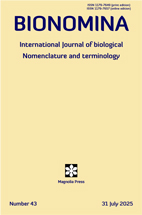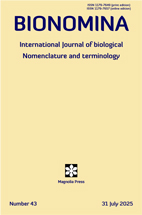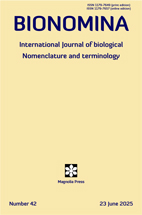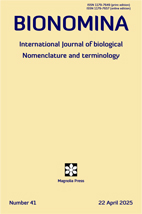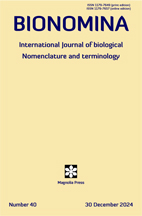-
Open Access
- View Open Access Papers
Bionomina is a hybrid journal and has published many open access papers:
We encourage the open access of papers as they are more widely read and cited. Our open access option has one of the lowest article processing fees.
Announcements
Bionomina has published 27 open access documents! 2024-02-01
Bionomina has published 27 open access documents of various types.
-
The “Kaiserian shortfall”, fishes, and the regulation of taxonomy by the Code
Published : 2025-12-22 -
Etymology of nomina and bibliography of reptiles of the Scattered Islands (Indian Ocean)
Published : 2025-12-22 -
Protection of the nomen Gehyra oceanica (Lesson, 1830) (Squamata) by the application of Article 23.9.1 of the Code
Published : 2025-12-22 -
Historical literature suggests a Sri Lankan origin for the etymology of the snake generic names Duberria Fitzinger, 1826 and Malpolon Fitzinger, 1826 (Reptilia, Serpentes)
Published : 2025-12-22 -
Aotus jorgehernandezi Defler & Bueno, 2007, a synonym of Aotus brumbacki Hershkovitz, 1983 (Mammalia, Primates)
Published : 2025-12-22 -
Notes on the nomenclature of spinorays (Chondrichthyes, Batomorphii, Apolithabatiformes)
Published : 2025-09-30
latest
-
Nomenclatural problems raised by the recent description of a new anaconda species (Squamata, Serpentes, Boidae), with a nomenclatural review of the genus Eunectes
Published : 2024-03-15 -
On the validity of the recently described northern green anaconda Eunectes akayima (Squamata, Serpentes)
Published : 2024-03-15 -
Published : 2021-09-28Eponyms as scientific recognition to Queen Astrid and King Leopold III of Belgium
-
Published : 2022-07-19Nomenclatural solutions for diagnosing ‘cryptic’ species using molecular and morphological data facilitate a taxonomic revision of the Black-bellied Salamanders (Urodela, Desmognathus ‘quadramaculatus’) from the southern Appalachian Mountains
-
The specimens of green anaconda, Boa murina Linnaeus, 1758 (Squamata, Serpentes, Boidae, Eunectes), from the collection of Albertus Seba, and recommendations for tracing historical specimens
Published : 2024-06-27 -
Problems with the nomenclatural availability and promulgation date of zoological works, nomina and nomenclatural acts published electronically online
Published : 2025-06-23



